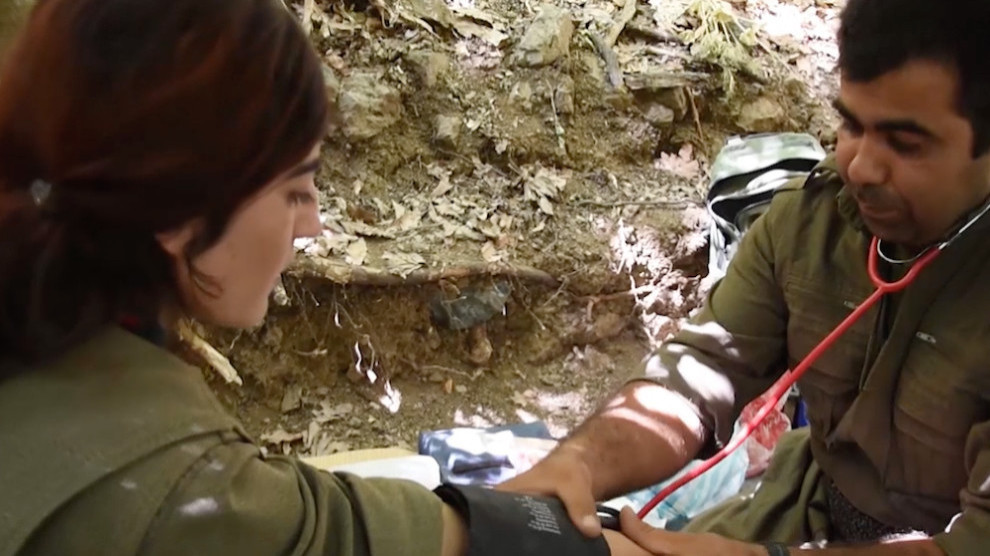From medical faculty to the mountains of Kurdistan
Kendal Amanos was a medical student when he joined the guerrilla in the mountains of Kurdistan. Now he is a guerrilla doctor in the Xakurke region.
Kendal Amanos was a medical student when he joined the guerrilla in the mountains of Kurdistan. Now he is a guerrilla doctor in the Xakurke region.

In the middle of the war zone we meet Kendal Amanos. He comes from Urfa, grew up in Osmaniye and joined the guerrilla as a medical student. Now he is a guerrilla doctor in Xakurke, an area in southern Kurdistan that the Turkish army has been trying to occupy for two months. We talked to him about his career, his work as a doctor in the mountains and the resistance in Xakurke.
We are in the mountains of Kurdistan, which the Turkish state is trying to occupy. You take part in the resistance as a guerilla fighter and doctor. How did that happen, why did you choose the PKK and the mountains?
Before I started my medical studies, I hardly knew the Kurdish movement. I did not know much about our social reality, had specific ideas. At the same time, I had a humanitarian understanding that also led me to my job. It made me happy to be able to do something for the people. That's why I opted for the health service. I have dealt with the question of how a healthy society can emerge. At the university I met other Kurds and read Abdullah Öcalan's defense. As a result, I felt more and more adhered to the Kurdish reality. Shortly before completing my studies, I decided to leave the system given to us. I realized that I had to take action against what is done to the Kurdish people. I witnessed the repression of the students in the revolutionary struggle. That's why I questioned a lot. I got to know the reality of the enemy. This gave me a consciousness and I felt that our struggle had to be increased. When I read the defence of Öcalan, I found that it contained the truth I was looking for. It was the right way for me to lead the fight in another area, with the guerrillas in the mountains of Kurdistan.
Now you are working in the mountains in the middle of the combat area as a doctor. How does that feel?
Friends with whom I am constantly with and share everything get wounded. In order to be able to help them, a special strength is necessary. We try not to deal with them emotionally. It happens that you lose a friend with whom you were traveling together and shared the same feelings. As a physician you have to put your feelings back and intervene immediately. I strive to fight against an enemy that rejects a free society and wants to produce its own enslaved society. I am a guerilla fighter in the mountains of Kurdistan, which is considered the cradle of humanity, and within this struggle I am also a doctor. In an area like here in Xakurke, it is important that I fulfill my task. For me it's a very special feeling when I treat a friend in these difficult conditions and see that they are happy. That gives me a lot of strength. In Xakurke, a brave and selfless fight is being waged against the enemy's sophisticated technique. Experiencing this struggle gives you the strength to stay on your feet and participate unconditionally.
How do you as a doctor deal with the conditions in the mountains? Is there an institutionalized health system? What is the treatment of the sick and injured like?
I never thought about it being difficult in the mountains. My attitude to the people and my love of nature make me forget the physical difficulties. Of course, health care work in the mountains is very different than in the city. A medical professional must be able to treat at all costs. There is always something that can be done for a person in need of treatment. You have to be creative and create the best treatment options yourself. In the city, you need to provide the patient with first aid in an emergency and then transport them to an equipped hospital. There are many ways and means. However, it is different by us. In the open terrain in the mountains, you must immediately create the necessary conditions for the sick or injured to get the best treatment possible. You know that the greatest enemy is time and conditions, and in this awareness you try to provide the best treatment possible.
We have an organized health care system in the mountains. Due to the present situation, we have no fixed locations, but constantly change places. We have health stations that we have adjusted to the conditions in the mountains and in the war. For us it is a constant task to create good and safe treatment options. This work is led by the Health Committee and its units. We have an academy where we carry out further training with the means at our disposal, the "M. Hayri Durmuş Health Academy". There are health stations in various areas, so that sick and injured people can be treated as quickly as possible. There are also mobile health and first aid teams. In addition, the guerrilla units are friends who we have trained in health care. They provide first aid and try to transport those affected to where better treatment is possible. The treatment usually begins on the way, because sometimes it takes days or weeks. In such a situation, of course, we are not just doctors, but primarily guerrilla fighters. We fight in the mountains against an enemy that has a sophisticated technology. Therefore, we must take the attitude of militants who can organize themselves. It is a question of consciousness.